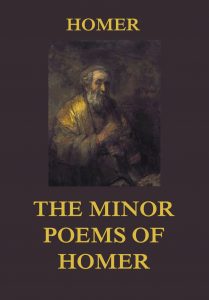The Minor Poems of Homer – Homer
This edition contains, besides a translation of the life of Homer, a plentitude of his minor and lesser known poems. Included are, among many other minor hymns:
Battle Of The Frogs And Mice
Hymn To Apollo
Hymn To Mercury
Hymn To Venus
Hymn To Ceres
Format: Paperback.
The Minor Poems of Homer.
ISBN: 9783849689438
Available at amazon.com and other venues.
Biography of the author (from Wikipedia):
Homer is the name ascribed by the ancient Greeks to the author of the Iliad and the Odyssey, two epic poems which are the central works of ancient Greek literature. The Iliad is set during the Trojan War, the ten-year siege of the city of Troy by a coalition of Greek states, but focuses on a quarrel between King Agamemnon and the warrior Achilles lasting a few weeks during the last year of the war. The Odyssey focuses on the journey home of Odysseus, king of Ithaca, after the fall of Troy.
Many accounts of Homer’s life circulated in classical antiquity, the most widespread being that he was a blind bard from Ionia, a region of central coastal Anatolia in present-day Turkey. The modern scholarly consensus is that these traditions do not have any historical value.
The Homeric question – by whom, when, where and under what circumstances were the Iliad and Odyssey composed – continues to be debated. Broadly speaking, modern scholarly opinion falls into two camps. One group holds that most of the Iliad and (according to some) the Odyssey is the work of a single poet of genius. The other considers the Homeric poems to be the crystallization of a process of working and re-working by many contributors, and that “Homer” is best seen as a label for an entire tradition. It is generally accepted that the poems were composed at some point around the late 8th or early 7th centuries BCE. The poems are in Homeric Greek, also known as Epic Greek, a literary language which shows a mixture of features of the Ionic and Aeolic dialects from different centuries; the predominant influence is Eastern Ionic. Most researchers believe that the poems were originally transmitted orally.
From antiquity until the present day, the influence of the Homeric epics on Western civilization has been great, inspiring many of its most famous works of literature, music, and visual art. The Homeric epics were the greatest influence on ancient Greek culture and education; to Plato, Homer was simply the one who “has taught Greece” – ten Hellada pepaideuken.
(The text of the last section was taken from a Wikipedia entry and is available under the Creative Commons Attribution-ShareAlike License.)
Publisher’s Note: This book is printed and distributed by Createspace a DBA of On-Demand Publishing LLC and is typically not available anywhere else than in stores owned and operated by Amazon or Createspace.

